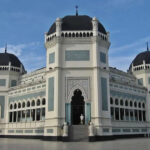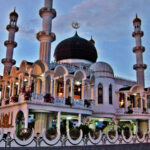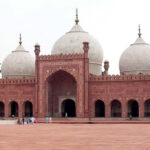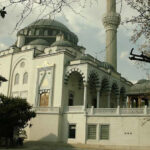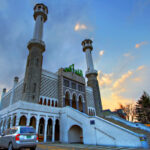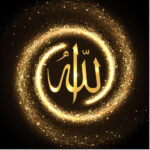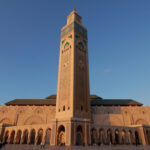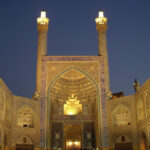*What Muslim Children Must Know Part 3*
https://youtu.be/STUIIySCE8Y
.
Ebook
What Muslim Children Must Know
https://d1.islamhouse.com/data/en/ih_books/single3/en-what-muslim-children-must-know.pdf
.
Question 35: What is the definition of Zakah? Answer: It is a due right on a specific type of property, to be given to a-specific group of people, at a specific time. It is one of the pillars of Islam and an obligatory charity that is taken from-the rich and given to the poor.
Allah Almighty says: (Give Zakah.) [Surat al-Baqarah: 43]
Question 36: What is the recommended charity? Answer: It is different from Zakah, as it is giving anything by way of charity to be used in any of the aspects of goodness at any time.
Allah Almighty says: (Spend in the way of Allah.) [Surat al-Baqarah: 195]
Question 37: What is the definition of Siyam (fasting)? Answer: It means worshiping Allah by abstaining from the invalidators of fasting from the break of dawn until sunset, while having the intention of-fasting. It is of two types: First: Obligatory fasting: such as fasting the month of Ramadan, which is-one of the pillars of Islam.
Allah Almighty says: (O you who believe, fasting is prescribed upon you as it was prescribed upon those who were before you, so that you may become righteous.} [Surat al-Baqarah: 183]
Second: Voluntary fasting: such as fasting on Mondays and Thursdays; fasting three days every month, the best of which are the White Days (13th, 14th, 15th) of every lunar month.
Question 38: What is the merit of fasting Ramadan? Answer: Abu Hurayrah (may Allah be pleased with him) reported that the Prophet (may Allah’s peace and blessings be upon him) said: “Whoever fasts Ramadan out of faith and seeking reward from Allah, will have his past sins forgiven.” [Agreed upon]
Question 39: What is the merit of voluntary fasting?
Answer: Abu Sa’id al-Khudri (may Allah be pleased with him) reported that the Prophet (may Allah’s peace and blessings be upon him) said: “Whoever fasts a day for the sake of Allah, Allah will keep his face away from Hellfire (the distance of) seventy autumns for that day.” [Agreed upon]
“Seventy autumns” means: seventy years.
Question 40: What are some of the invalidators of fasting?
Answer:
1. Eating and drinking deliberately
2. Vomiting deliberately
3. Apostasy
Question 41: What are the Sunnah acts of fasting?
Answer:
1. Hastening to break the fast
2. Having the Suhur (pre-dawn meal) and delaying it
3. Increasing good deeds and acts of worship
4. Saying: “I am fasting” if insulted
5. Supplicating at the time of breaking the fast
6. Breaking the fast by fresh dates or ripe dates, or drinking water if dates-are unavailable
Question 42: What is the definition of Hajj (pilgrimage)? Answer: Hajj means worshiping Allah Almighty by visiting His Sacred House and performing specific rituals during a specific time.
Allah Almighty says: (Pilgrimage to the House is a duty owed to Allah upon all people who are able to make their way to it; whoever disbelieves, then Allah is in no need for the worlds.} [Surat Al ‘Imran: 97]
Question 43: How many pillars of Hajj are there? Answer:
1. Ihram (entering the ritual state of consecration)
2. Standing at ‘Arafah
3. Performing the Tawaf (circumambulating the Ka’bah) of Ifadah (pouring forth)
4. Performing Sa’y (walking at a brisk pace) between Safa and Marwah.
Question 44: What is the merit of Hajj?
Answer: Abu Hurayrah (may Allah be pleased with him) reported that the Prophet (may Allah’s peace and blessings be upon him) said: “Whoever performs Hajj for the sake of Allah, while abstaining from intercourse and foul language, will return (free from sins) as if he were born anew.” [Narrated by Al-Bukhari and others]
“As if he were born anew” means free from sins.
Question 45: What is the definition of ‘Umrah?
Answer: ‘Umrah (minor pilgrimage) means worshiping Allah Almighty by visiting His Sacred House to perform specific rituals at any time.
Question 46: What are the pillars of ‘Umrah?
Answer:
1. Ihram (entering a ritual state of consecration)
2. Tawaf (circumambulating the Ka’bah)
3. Sa’y (walking at a brisk pace) between Safa and Marwah
Question 47: What is Jihad (striving) in the cause of Allah?
Answer: It means exerting one’s utmost effort in spreading Islam and-defending it and its people or fighting the enemies of Islam and Muslims. Allah Almighty says: (And strive in the cause of Allah with your wealth and your lives. That is best for you, if only you knew.) [Surat at-Tawbah: 41]
The Prophetic Sirah (Biography) Section
Question 1: What is the lineage of our Prophet Muhammad (may Allah’s peace and blessings be upon him)?
Answer: He is Muhammad ibn ‘Abdullah ibn ‘Abd al-Muttalib ibn Hashim. Hashim was from the Quraysh, which belongs to the Arabs, who are from the offspring of Isma’il (Ishmael) the son of Ibrahim (Abraham) (peace be upon him).
Question 2: What is the name of our Prophet’s mother?
Answer: Aminah bint Wahb..
Question 3: When did his father die?
Answer: His father died in Madinah when he was still an embryo and was-not born.
Question 4: When was the Prophet (may Allah’s peaceand blessings be upon him) born?
Answer: He was born in the Year of the Elephant, on Monday, in Rabi’ al Awwal.
Question 5: Where was he born?
Answer: In Makkah.
Question 6: Who are his wet nurses? Answer: Umm Ayman, the bondmaid of his father
– Thuwaybah, the bondmaid of his uncle Abu Lahab
-Halimah as-Sa’diyyah
Question 7: When did his mother die?
Answer: His mother died when he was six years old, and his grandfather, ‘Abdul-Muttalib, took care of him after his mother’s death.
Question 8: Who took care of him after the death of his grandfather ‘Abdul-Muttalib?
Answer: When he was eight years old, his grandfather died and his uncle, Abu Talib, took care of him.
Question 9: When did he travel with his uncle to the-Levant?
Answer: He traveled with his uncle to the Levant when he was twelve-years old.
Question 10: When was his second trip? Answer: He traveled for the second time on a trade journey with the money of Khadijah (may Allah be pleased with her). When he returned, he-married her when he was twenty-five years old.
Question 11: When did the Quraysh rebuild the Ka’bah? Answer: The Quraysh rebuilt the Ka’bah when he was thirty-five years old.
On disagreeing about who would restore the Black Stone to its place, they sought his judgment; so, he put it on a piece of cloth and ordered each of the four tribes to hold one end of the cloth. Then, when they lifted it, he (may Allah’s peace and blessings be upon him) restored it to its place with his hands.
Question 12: How old was he when he was assigned the mission of prophethood? To whom was he sent?
Answer: He was forty years old, and he was sent as a bringer of glad tidings and as a warner to all people.
Question 13: How did the revelation start?
Answer: It started with the true vision: He would see no vision, except that it would occur just the way he had seen it.
Question 14: What was his state before the revelation? When did the revelation descend upon him the first time?
Answer: He was worshiping Allah in the Cave of Hira’, and the revelation descended upon him while he was in the cave in that-state.
Question 15: What were the first Qur’anic verses that-were revealed to him?
Answer: The verses where Allah Almighty says: {Read in the name of your Lord Who created, created man from a clinging clot. Read, and your Lord is the Most Generous, Who taught by the pen, taught man what he did not know.} [Surat al-‘Alaq: 1-5]
Question 16: Who was the first one to believe in his-message?
Answer: The first to believe in his message from among the men was Abu-Bakr; from the women: Khadijah bint Khuwaylid; from the boys: ‘Ali ibn-Abi Talib; from the freed slaves: Zayd ibn Härithah; and from the salves: Bilal al-Habashi (may Allah be pleased with them), in addition to others
Question 17: How was Da’wah (preaching) to Islam-carried out?
Answer: Da’wah to Islam was carried out secretly for almost three years.
Then, the Prophet (may Allah’s peace and blessings be upon him) was-commanded to call people to Islam in public.
Question 18: What was the state of the Prophet (may Allah’s peace and blessings be upon him) and those who believed in him after starting to make-Da’wah publicly?
Answer: The polytheists started hurting him and the Muslims severely, until the believers were given the permission to emigrate to Najāshi (Negus) in Abyssinia.
The polytheists unanimously agreed to kill the Prophet (may Allah’s peace and blessings be upon him); nevertheless, Allah protected him andsupported him with his uncle, Abu Talib, to defend him against them.
Question 19: Who died in the tenth year of the Bi’thah(start of the Prophet’s mission)?
Answer: Both his uncle Abu Talib and his wife Khadijah (may Allah be pleased with her).
Question 20: When did the Isra’ (Night Journey) along-with the Mi’raj (Ascension Journey) take place?
Answer: It took place when the Prophet (may Allah’s peace and blessings be upon him) was fifty years old. In this journey the five prayers were prescribed.
The Isra’: It was a journey from the Sacred Mosque to the Aqsa Mosque.
The Mi’raj: It was ascension from the Aqsa Mosque to the heaven, then to the Sidrat al-Muntaha (the Lote Tree of the Utmost Boundary).
Question 21: How did the Prophet (may Allah’s peace and blessings be upon him) call people to Allah-outside of Makkah?
Answer: He called the people of Ta’if to Islam and presented himself to people in their gathering seasons, until the Ansar (the Supporters) from among the people of Madinah came and pledged allegiance to support-him.
Question 22: How long did the Prophet (may Allah’s peace and blessings be upon him) stay in Makkah preaching?
Answer: He stayed there for thirteen years.
Question 23: To where did the Prophet (may Allah’s peace and blessings be upon him) emigrate?
Answer: He emigrated from Makkah to Madinah.
Question 24: How long did he stay in Madinah? Answer: Ten years.
Question 25: What were the Islamic legislations that were prescribed when he was in Madīnah?
Answer: Zakah, fasting, Hajj, Jihad, the Adhan (call to prayer) besides-other Islamic legislations that were prescribed when he was in Madinah.
Question 26: What are his most important battles?
Answer: -The Battle of Badr
-The Battle of ‘Uhud
-The Battle of the Ahzab (the confederates)
-The Battle of the Conquest of Makkah
Question 27: What is the last thing revealed of the Qur’an?
Answer: The verse where Allah Almighty says: {And fear the Day when you will be brought back to Allah. Then every soul will be rewarded in full for what it has earned, and none will be wronged.) [Surat al-Baqarah: 281]
Question 28: When did the Prophet (may Allah’s peace-and blessings be upon him) die? How old was-he?
Answer: He died in Rabi’ al-Awwal, in the eleventh year of Hijrah. He was sixty-three years old,
Question 29: Who were the wives of the Prophet (may Allah’s peace and blessings be upon him)?
Answer:
1. Khadijah bint Khuwaylid (may Allah be pleased with her)
2. Sawdah bint Zam’ah (may Allah be pleased with her)
3. ‘A’ishah bint Abu Bakr (may Allah be pleased with her)
4. Hafsah bint ‘Umar (may Allah be pleased with her)
5. Zaynab bint Khuzaymah (may Allah be pleased with her)
6. Umm Salamah Hind bint Abu Umayyah (may Allah be pleased with her)
7. Umm Habibah Ramlah bint Abu Sufyan (may Allah be pleased with her).
8. Juwayriyah bint al-Harith (may Allah be pleased with her)
9. Maymünah bint al-Harith (may Allah be pleased with her)
10. Safiyyah bint Huyayy (may Allah be pleased with her)
11. Zaynab bint Jahsh (may Allah be pleased with her)
Question 30: Who are the Prophet’s sons and daughters?
Answer: The Prophet (may Allah’s peace and blessings be upon him) had three sons, who are:
Al-Qasim, after whom he was nicknamed as “Abu al-Qasim”
-‘Abdullah
– Ibrahim
He had four daughters, who are:
– Fatimah
– Ruqayyah
-Umm Kulthum
– Zaynab
He had all of his children from Kahdijah (may Allah be pleased with her), except Ibrahim. All of them died before him, except Fatimah who died six months after his death.
Question 31: Mention some of the physical characteristics of the Prophet (may Allah’s peace and blessings be upon him).
Answer: He was of average height, not too short and not too tall. He had a white complexion, which was slightly reddish. He had a thick beard, big eyes, and a wide mouth. His hair was extremely black, his shoulders were broad, his smell was pleasant, in addition to other beautiful-characteristics.
Q31: Upon what did the Prophet (may Allah’s-peace and blessings be upon him) leave his-Ummah?
Answer: He left his Ummah upon the clear path, whose night is as clear as its day and no one will deviate from it except one who is doomed. He has guided his Ummah to all goodness and has warned them against all evil.
The Tafsir Section
Q1: Recite Surat al-Fatihah and explain it.
Answer: Surat al-Fatihah and its Interpretation
(Bismillahir Rahmanir Rahim (In the name of Allah, the Most Compassionate, the Most Merciful) Al-hamdullahi Rabbil ‘Alamin (All praise be to Allah, the Lord of the worlds), Ar-Rahmanir Rahim (the Most Compassionate, the Most Merciful), Maliki yawmid-din (Master of the Day of Judgment). Iyyaka na’budu wa iyyaka nasta în (You alone we worship, and You alone we ask for help). Ihdinās sirātal mustaqim (Guide us to the straight path), Sirätal ladhina an’amta ‘alayhim, ghayril maghdübi ‘alayhim walad-dāllin (the path of those whom You have blessed; not of those who incurred Your Wrath, or of those who went astray).] [Surat al-Fatihah: 1-7]
Interpretation
Surat al-Fatihah (the Opening) was given this name because it is the surah with which the Noble Qur’an begins.
1. (Bismillahir Rahmanir Rahim): In the name of Allah I start reciting the Qur’an, seeking His help and seeking blessing by mentioning His name.
{Allah): The One Who is truly worthy of worship, and none is given that name except the Almighty Lord..
(Ar-Rahman): The-One-Whose-extensive-mercy-encompasses-everything.
(Ar-Rahim): The One Who shows mercy to the believers.
2. (Al-hamdullahi Rabbil ‘Alamin): All kinds of praise and perfection. belong to Allah alone.
3. Ar-Rahmanir Rahim): The One Whose extensive mercy encompasses everything, and the One Who bestows mercy upon the-believers.
4. (Maliki yawmid-din): It refers to the Day of Judgment.
5. (lyyaka na’budu wa iyyaka nasta in}: We worship You alone and-we seek help from You alone.
6. {lhdinās sirätal mustaqim): It refers to guidance to Islam and the Sunnah.
7. (Sirätal ladhina an’amta ‘alayhim, ghayril maghdübi ‘alayhim walad-dallin): The path of the righteous slaves of Allah from the prophets and their followers, which is different from the path of the Christians and the Jews.
-It is Sunnah to say: “Amin” (Answer our supplication!) after reciting Surat al-Fatihah.
Question 2: Recite and explain Surat az-Zalzalah.
Answer: Surat az-Zalzalah and its Interpretation
In the name of Allah, the Most Compassionate, the Most Merciful (When the earth is shaken with a mighty quake, and the earth throws out its burdens, and man says, “What is the matter with it?” On that Day it will recount all its news because your Lord has inspired it [to do so]. On that Day, all people will come forward in separate groups to be shown their deeds. So whoever does an-atom’s weight of good will see it, and whoever does an atom’s weight of evil will see it.)
[Surat az-Zalzalah: 1-8]
Interpretation
1. (Idha zulzilat al-ardu zilzalaha): When the earth is severely shaken on the Day of Judgment.
2. (Wa akhrajat al-ardu athqälaha}: And when the earth brings out what is inside it of the dead and other things.
3. (Wa qal al-insänu mā lahā): And man says confusedly: “Why is the earth moving and shaking like that?!”
4. {Yawma’idhin tuhaddithu akhbäraha): On that great Day, the earth will speak of what goodness and evil had been done on it.
5. (Bi’anna rabbaka awha laha): Because Allah informed it and commanded it to do so.
6. (Yawma’idhin yasduru an-nāsu ashtätan liyuraw a’mālahum}: On that great Day, when the earth is shaken, people will come in groups for Reckoning and they will be shown their worldly deeds.
7. {Faman ya’mal mithqāla dharratin khayran yarah): Whoever does an atom’s weight of good will see it in front of him.
8. (Waman y’amal mithqāla dharratin sharran yarah): And whoever does its weight of evil will see it in front of him.
Question 3: Recite and explain Surat al-‘Adiyat.
Answer: Surat al-Adiyat and its Interpretation
In the name of Allah, the Most Compassionate, the Most Merciful
(By the galloping, panting horses, striking sparks of fire [with their hooves], launching raids at dawn, stirring up thereby clouds of dust, plunging thereby into the midst of the enemy, indeed, man is very ungrateful to his Lord and he himself is a witness to that – and he is truly extreme in his love of wealth. Does he not know that the contents of graves will be overturned, and the secrets of the hearts will be brought to light? Indeed, their Lord is All-Aware of them on that Day.) [Surat al-‘Adiyat: 1-11]
Interpretation:
1. (Wal’adiyāti dabha): Allah swears by the horses that run so fast that-the sound of their breathing is heard.
2. (Falmuriyati qad-ha): He also swears by the horses that strike sparks-of fire with their hooves when strongly coming in contact with the rocks.
3. (Falmughīrāti subha): He swears by the horses that attack the-enemies in the morning.
4. (Fa’atharna bihi naq’a): So, they stir up dust by their running.
5. (Fawasatna bihi jam’a): Plunging with their riders into the midst of a-group of the enemies.
6. (Inna al-insana li rabbihi lakanud): Indeed, man withholds the-goodness that his Lord commands him to give out.
7. (Wa innahu ‘ala dhalika lashahid): He himself is a witness to his-own withholding of goodness, and he cannot deny it because it is so clear.
8. {Wa innahu lihubbi al-khayri lashadid): Due to his extreme love for money, he greedily withholds it.
9. (Afala ya’lamu idha b’uthira mã filqubûr): Does this man, who is deceived by the worldly life, not know that when Allah brings out the dead from the graves and out of the earth for reckoning and recompense that things will not be the way he fancied?!
10. (Wa hussila ma fi as-sudur): What is in the hearts of intentions, beliefs, and others will be shown and brought to light.
11. (Inna rabbahum bihim yawma’idhin lakhabir): Indeed, their Lord is All-Aware of them on that Day, and nothing of His slaves’ affairs will be hidden from Him and He shall recompense them for it.
Question 4: Recite and explain Surat al-Qari’ah.
Answer: Surat al-Qari’ah and its Interpretation
In the name of Allah, the Most Compassionate, the Most Merciful
{The Striking Calamity! What is the Striking Calamity? How do you know what the Striking Calamity is? On that Day people will be like scattered moths, and the mountains will be like carded wool. Then the one whose scales of good deeds are heavy, will have a pleasant life. But the one whose scales of good deeds are light; his abode will be the abyss. And how do you know what it is? It is a Blazing Fire.) [Surat al-Qari’ah: 1-11]
Interpretation
1. (Al-Qari’ah): The Hour that strikes people’s hearts because of it being
extremely terrifying.
2. (Mal qari’ah): What is this Hour that strikes people’s hearts because-of it being extremely terrifying?!
3. {Wa mä adräka mal qari’ah): How do you know – O Messenger – what this Hour is that strikes people’s hearts because of it being extremely terrifying? It is the Day of Judgment.
4. {Yawma yakunun nāsu kal farashil mabthuth): The day it strikes people’s hearts, they will be like the moths scattered here and there.
5. (Wa takūnul jibālu kal ‘ihnil manfüsh): The mountains will be like carded wool, fluffed up.
6. (Fa’ammā man thaqulat mawazīnuh): The one whose good deeds outweigh his bad deeds.
7. (Fahuwa fi ishatir rädiyah): He will enjoy a pleasant life in Paradise.
8. {Wa amma man khaffat mawazīnuh): The one whose bad deeds outweigh his good deeds.
9. (Fa’ummuhu häwiyah): His abode and dwelling will be Hellfire. 10. (Wa mā adräka mä hiyah): How do you know – O Messenger – what it is?
11. (Närun hämiyah): It is a blazing fire.
Question 5: Recite and explain Surat at-Takathur. Answer: Surat at-Takathur and its Interpretation
In the name of Allah, the Most Compassionate, the Most Merciful (Competition for worldly gains distracts you [from Allah], until you come to your graves. No indeed! You will come to know. Again no! You will come to know. No indeed! If only you knew for certain. You will surely see the Blazing Fire, Again, you will see it-with absolute certainty. Then on that Day you will surely be asked-about your worldly pleasures.) [Surat at-Takathur: 1-8]
Interpretation
1. (Alhäkumut takathur): O people, boasting about your wealth and children distracted you from obeying Allah.
2. {Hatta zurtumul maqäbir): Until you die and enter your graves.
3. (Kalla sawfa ta’lamün): You should not have been distracted byboasting, and you will come to realize the consequence of that distraction.
4. (Thumma kalla sawfa ta’lamûn}: Then, you will come to realize its consequence.
5. (Kalla law ta’lamuna ‘ilmal yaqin): Truly, if you had known for certain that you will be resurrected to Allah Who will recompense you for your deeds, you would not have been distracted by boasting about wealth and children..
6. {Latara wunnal jahim): By Allah, you will surely see Hellfire on the Day of Judgment.
7. {Thumma latara wunnaha ‘aynal yaqin): Again, you will see it with absolute certainty.
8. (Thumma latus’alunna yauma’idhin ‘anin na’im): Then, on that Day Allah will ask you about the blessings that He bestowed upon you including health, wealth, and others.
Question 6: Recite and explain Surat al-‘Asr.
Answer: Surat al-‘Asr and its Interpreation In the name of Allah, the Most Compassionate, the Most Merciful
(By the time, man is in utter loss, except those who believe and do righteous deeds, and exhort one another to the truth and exhort one another to patience.} [Surat al-‘Asr: 1-3]
Interpretation
1. (Wal asr): Allah Almighty swears by time.
2. (Innal insana lafi khusr): All mankind are in utter loss.
3. (Illal ladhina amanu wa ‘amilus salihāti wa tawasaw bil-haqqi wa tawasaw bis-sabr): The only survivors of that loss are those who believe and perform righteous deeds and at the same time call to the truth and endure it with patience.
Question 7: Recite and explain Surat al-Humuzah.
Answer: Surat al-Humazah and its Interpretaion In the name of Allah, the Most Compassionate, the Most Merciful
{Woe to every backbiter and slanderer, who amasses wealth and counts it over and again, thinking that his wealth will make him live forever. No indeed! He will surely be cast into the Crushing Fire, and how do you know what the Crushing Fire is? It is the kindled Fire of Allah, which reaches the hearts. It will be closed down upon them, locked with towering columns.) [Surat al Humazah: 1-9]
(By the time, man is in utter loss, except those who believe and do righteous deeds, and exhort one another to the truth and exhort one another to patience.) [Surat al-‘Asr: 1-3]
Interpretation
1. {Wal ‘asr): Allah Almighty swears by time.
2. (Innal insana lafi khusr): All mankind are in utter loss.
3. {Illal ladhina amanu wa ‘amilus sälihāti wa tawasaw bil-haqqi wa tawasaw bis-sabr): The only survivors of that loss are those who believe and perform righteous deeds and at the same time call to the truth and endure it with patience.
Q7: Recite and explain Surat al-Humuzah. Answer: Surat al-Humazah and its Interpretaion
In the name of Allah, the Most Compassionate, the Most Merciful
{Woe to every backbiter and slanderer, who amasses wealth and counts it over and again, thinking that his wealth will make him live forever. No indeed! He will surely be cast into the Crushing Fire, and how do you know what the Crushing Fire is? It is the kindled Fire of Allah, which reaches the hearts. It will be closed down upon them, locked with towering columns.} [Surat al Humazah: 1-9]
Interpretation
1. (Wailul likulli humazatil lumazah): Woe and severe torment to everyone who frequently backbites and slanders people.
2. {Alladhi jama’a malaw wa ‘addadah): The one who is interested in nothing but accumulating and counting money.
3. (Yahsabu anna mālahu akhladah): He thinks that the money he has amassed will save him from death and keep him live forever.
4. (Kalla layumbadhanna fil hutamah): Things will not be the way this ignorant person has fancied. Indeed, he will be cast in Hellfire and will be crushed therein by its severity.
5. (Wa ma adrāka mal-hutamah): How do you know – O Messenger -what this Fire is that crushes everything thrown therein?
6. (Närullähil müqadah): It is the kindled Fire of Allah.
7. (Allati tattali’u ‘alal af’idah): That penetrates people’s bodies reaching their hearts.
8. Innaha ‘alayhim mu’sadah): It is closed down upon those tormented therein.
9. (Fi ‘amadim mumaddadah): It is locked with long and extended columns so that they are not able to come out.
Visits: 1















